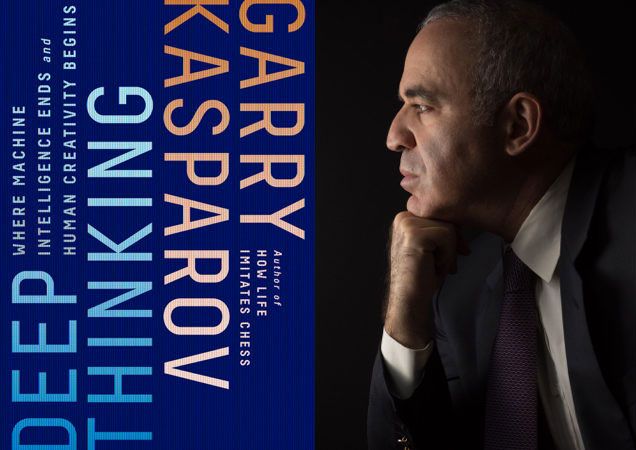
Deep Thinking: Kasparov On Tour
Garry Kasparov is currently touring to promote his latest book, "Deep Thinking," in which he not only looks back at the famous match(es) with Deep Blue in the 1990s, but also discusses at length the role of artificial intelligence in the modern era.
Kasparov with Stephen Fry the Hay Festival. | Image courtesy BBC.
"In brisk and brutal fashion, the I.B.M. computer Deep Blue unseated humanity, at least temporarily, as the finest chess playing entity on the planet yesterday, when Garry Kasparov, the world chess champion, resigned the sixth and final game of the match after just 19 moves, saying, 'I lost my fighting spirit.'"
This is how Bruce Weber's report in the New York Times began on Kasparov's famous loss against IBM's super computer Deep Blue, exactly 20 years ago on May 11, 1997. Even though mankind managed to hold up for a bit longer, this match is seen as the turning point in history where the computer started to become too strong for humans in chess. In fact, it has grown into a metaphor for the rise of artificial intelligence (though Kasparov still argues that Deep Blue was far from intelligent).

In "Deep Thinking" Kasparov looks back, shares memories and analyses the match in detail. In a recent article on Medium, the author describes the process of writing the book.
"Writing this book became type of therapy. It was a painful process, but I learned a great deal about myself and my opponent, and am now very glad I had the opportunity to turn all this experience into a positive story that I could share with the world. I make it clear in Deep Thinking that my loss to Deep Blue was also a victory for humans — its creators and everyone who benefits from our technological leaps. That is, everyone. This is always the case in the big picture, and why the book rejects the ‘man vs machine’ competition storyline. The machines work for us, after all. The last third of the book is about the bright future of our lives with intelligent machines, if we are ambitious enough to embrace it. I hope my optimism is contagious."
So far "Deep Thinking" has had excellent media coverage. From Business Insider to Nature to Esquire to the Financial Times, many mainstream media have reviewed the book positively. The most recent piece is Scientific American's interview with AI expert Murray Campbell who was part of the Deep Blue team in 1997.
Obviously most media focus on the author himself, and Kasparov has appeared in dozens of radio and TV shows and podcasts. Besides, he is on tour and attended several events where he spoke about AI and his experiences. Below are a few examples.
On 5 May 2017 Kasparov was in the studio of Yahoo News to talk about the book. (The interview starts with that other topic he is largely occupied with these days: Vladimir Putin.)
On 11 May he featured in a podcast by Tyler Cowen, an American intellectual who tries to "engages today’s deepest thinkers in wide-ranging explorations of their work, the world, and everything in between." Earlier guests in the show were e.g. Malcolm Gladwell, Stephen Pinker and Peter Thiel.
Five days later Kasparov joined CBC Radio for a version of the story, and then there was another podcast from NBC News, where Kasparov was interviewed by Chuck Todd, moderator of "Meet the Press." He also spoke with BBC2's Jeremy Vine—who couldn't resist getting smashed on the board:
Brilliant interview RT @BBCRadio2: Watch @TheJeremyVine take on former World Champion @Kasparov63 at chess #r2vine pic.twitter.com/5YQTF1U4SM
— Chris Ward (@ChrisaWARD) May 30, 2017
Also on 17 May, Kasparov was one of the guests of TechCrunch Disrupt, an annual conference hosted by TechCrunch for new new technology startups to launch their products and services competing on stage in front of venture capital potential investors, media and others.
Around the same time a TED Talk by Kasparov was published. It had been filmed a month before in Vancouver, Canada and forms the same story, but even more compact, and as a monologue. It's perhaps the best choice for if you have little time and want to know the champion's current views.
On Facebook Kasparov added a paragraph because he said he was running low on time and skipped a section of his talk toward the end:
"We don’t get to pick and choose when and where technological progress stops. People whose jobs are on the chopping block of automation also depend on the next wave of technology to create sustainable new jobs. More intelligent technology is also easier to use—just compare what a child can do with an iPad today versus the training required to create anything on a PC just twenty years ago. Machines that replace physical labor have allowed us to focus more on developing our minds. Intelligent machines are continuing that process, taking over the more menial aspects of cognition and elevating our lives toward curiosity, creativity, beauty, and joy."
To finish this (not complete) overview of recent media appearances by Kasparov, the following cannot be left out. It's two heroes of mine (PD) on one stage! The great Stephen Fry interviewed Kasparov during last week's Hay Festival in Hay-on-Wye, Powys, Wales. Bill Clinton once described it as "the Woodstock of the mind."
Fry happens to know a thing or two about chess: At the start of the interview he reveals that he attended every game of the Kasparov-Short match in 1993 in London. His love for language certainly shines through the interview as well.
(The video is not embedded but clicking on the image below leads you to the BBC website to watch the interview in full.)
@Kasparov63 is speaking at the Hay Festival today, and the @Telegraph will be there. Prompts me to post this great Matt cartoon pic.twitter.com/PQGf7N0Zrs
— Leon Watson ♛ (@LeonWatson) May 28, 2017



